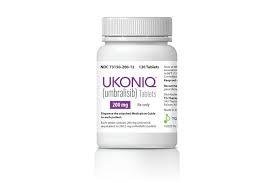Ukoniq Disease Interactions
There are 4 disease interactions with Ukoniq (umbralisib).
Umbralisib (applies to Ukoniq) cutaneous reactions
Moderate Potential Hazard, Moderate plausibility. Applicable conditions: Dermatitis - Drug-Induced
Severe cutaneous reactions, including fatal cases of exfoliative dermatitis, have been reported with the use of umbralisib. Care should be exercised when using this drug in patients with preexisting dermatological conditions. It is recommended to monitor patients for new or worsening cutaneous reactions and to withhold treatment for Grade 3 cutaneous reactions until resolution. Upon resolution, umbralisib should be reintroduced at a reduced dose. Discontinue umbralisib if a severe cutaneous reaction does not improve, worsens, or recurs. Discontinue treatment for life-threatening cutaneous reactions or Stevens-Johnson syndrome, toxic epidermal necrolysis, or drug reaction with eosinophilia and systemic symptoms of any grade and provide supportive care as appropriate.
References
- (2021) "Product Information. Ukoniq (umbralisib)." TG Therapeutics
Umbralisib (applies to Ukoniq) infections
Moderate Potential Hazard, Moderate plausibility. Applicable conditions: Infection - Bacterial/Fungal/Protozoal/Viral
Serious and opportunistic infections, sometimes fatal, have been reported with the use of umbralisib. Care should be exercised when using this drug in patients with preexisting infections. It is recommended to monitor patients for new or worsening signs and symptoms of infection and withhold treatment for Grade 3 or 4 infection. Upon resolution, umbralisib should be reintroduced at the same or a reduced dose and to withhold suspected Pneumocystis jirovecii pneumonia (PJP) of any grade or permanently discontinue treatment for confirmed PJP. In patients with cytomegalovirus (CMV) withhold treatment until infection or viremia resolves and closely monitor for CMV reactivation by PCR or antigen test at least monthly. Prophylactic treatment for opportunistic infections is recommended as appropriate according to medical practices.
References
- (2021) "Product Information. Ukoniq (umbralisib)." TG Therapeutics
Umbralisib (applies to Ukoniq) liver dysfunction
Moderate Potential Hazard, Moderate plausibility. Applicable conditions: Liver Disease
Umbralisib is predominantly metabolized by the liver. Serious hepatotoxicity has been reported in patients treated with umbralisib. No dose adjustment is recommended for patients with mild liver dysfunction (total bilirubin up to the upper limit of normal [ULN] and AST greater than ULN or total bilirubin greater than 1 to 1.5 × ULN and any AST). Care should be exercised when giving this drug to patients with moderate (total bilirubin greater than 3 × ULN and any AST) or severe (total bilirubin greater than 1.5 to 3 × ULN and any AST) liver dysfunction as its effects have not been studied in these patients. It is recommended to monitor liver function tests at baseline and treatment as clinically indicated.
References
- (2021) "Product Information. Ukoniq (umbralisib)." TG Therapeutics
Umbralisib (applies to Ukoniq) renal dysfunction
Moderate Potential Hazard, Moderate plausibility.
Care should be exercised when using umbralisib in patients with severe renal dysfunction (CrCl less than 30 mL/min) as its effects have not been studied in this patient population. No dose adjustment is recommended in patients with mild or moderate renal impairment (CrCl 30 to 89 mL/min).
References
- (2021) "Product Information. Ukoniq (umbralisib)." TG Therapeutics
Ukoniq drug interactions
There are 187 drug interactions with Ukoniq (umbralisib).
Ukoniq alcohol/food interactions
There is 1 alcohol/food interaction with Ukoniq (umbralisib).
More about Ukoniq (umbralisib)
- Ukoniq consumer information
- Check interactions
- Compare alternatives
- Drug images
- Latest FDA alerts (2)
- Side effects
- Dosage information
- During pregnancy
- FDA approval history
- Drug class: multikinase inhibitors
- En español
Related treatment guides
Drug Interaction Classification
| Highly clinically significant. Avoid combinations; the risk of the interaction outweighs the benefit. | |
| Moderately clinically significant. Usually avoid combinations; use it only under special circumstances. | |
| Minimally clinically significant. Minimize risk; assess risk and consider an alternative drug, take steps to circumvent the interaction risk and/or institute a monitoring plan. | |
| No interaction information available. |
Further information
Always consult your healthcare provider to ensure the information displayed on this page applies to your personal circumstances.


